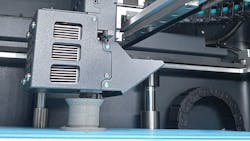Unique Quality-Control Software Sets Sights on Revolutionizing 3D Printing
Araqev, a Purdue University-related company, has commercialized a quality-control software for additive manufacturing and 3D printing technologies that any sector could benefit from.
The software offers unique advancements to the 3D printing sector by printing products in only a few design iterations, reducing less scrap and machining time, speeding up production, and improving satisfaction with the final printed part.
"We estimate that the quality-control issue with additive manufacturing can lead to nearly $2 billion in global losses annually based on a model for the production costs of metal additive manufacturing systems that was developed by Baumers, Dickens, Tuck, and Hague in their 2016 paper published in the peer-reviewed journal Technological Forecasting and Social Change," said Arman Sabbaghi, Araqev's CEO and president.
To use the innovative software, customers upload their nominal design files and scanned point cloud data from their printed products. According to Araqev, the algorithms also enable the transfer of knowledge encoded via machine learning models across different materials, printers, and shapes in an additive manufacturing system.
"Our software uses these inputs to fit machine learning models that can simulate shape deviations for future printed products," Sabbaghi said.
"Furthermore, the machine learning models enable our software to derive modifications to the nominal designs, known as compensation plans, so that when the modified designs are printed, they will exhibit fewer shape deviations compared to the case when the original designs are printed."
To demonstrate and test its algorithms, Araqev ran experiments on the Markforged Metal X 3D printer using 17-4 PH stainless steel material. They found that the algorithms reduced shape inaccuracies by 30 to 60%, depending on the geometry of the part.
Araqev says it is establishing direct partnerships with 3D printing manufacturers and companies using 3D technology that will enable the company to scale quickly, says Sabbaghi.
"We will establish licensing contracts after demonstrating to the companies the savings and benefits that we can offer for their processes," Sabbaghi said.
"These partners will incorporate our software into their systems and sell them to their customers, which provides us with a significant customer channel."
About the Author
Laura Davis
Editor-in-Chief, New Equipment Digest
Laura Davis is the editor in chief of New Equipment Digest (NED), a brand part of the Manufacturing Group at EndeavorB2B. NED covers all products, equipment, solutions, and technology related to the broad scope of manufacturing, from mops and buckets to robots and automation. Laura has been a manufacturing product writer for eight years, knowledgeable about the ins and outs of the industry, along with what readers are looking for when wanting to learn about the latest products on the market.

